Filter by

Applying Reflective Equilibrium
This open access book provides the first explicit case study for an application of the method of reflective equilibrium (RE), using it to develop and defend a precautionary principle. It thereby makes an important and original contribution to questions of philosophical method and methodology. The book shows step-by-step how RE is applied, and develops a methodological framework which will be us…
- Edition
- 1
- ISBN/ISSN
- 978-3-031-04333-8
- Collation
- -
- Series Title
- Logic, Argumentation & Reasoning
- Call Number
- XI, 273

Thinking like a Mall: Environmental Philosophy after the End of Nature
A provocative argument that environmental thinking would be better off if it dropped the concept of ""nature"" altogether and spoke instead of the built environment.OCLC-licensed vendor bibliographic record.
- Edition
- -
- ISBN/ISSN
- 9780262326988
- Collation
- 1 online resource (x, 283 pages) :illustrations
- Series Title
- -
- Call Number
- -
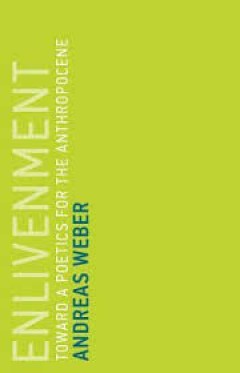
Enlivenment :toward a poetics for the Anthropocene
A new understanding of the Anthropocene that is based on mutual transformation with nature rather than control over nature. We have been told that we are living in the Anthropocene, a geological era shaped by humans rather than by nature. In Enlivenment , German philosopher Andreas Weber presents an alternative understanding of our relationship with nature, arguing not that humans control natur…
- Edition
- -
- ISBN/ISSN
- 9780262352277
- Collation
- 1 online resource (208 pages).
- Series Title
- -
- Call Number
- -
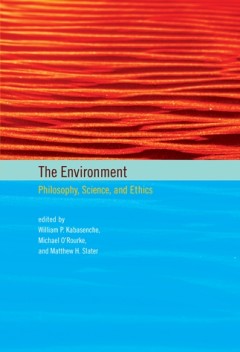
The environment :philosophy, science, and ethics
Philosophical reflections on the environment began with early philosophers' invocation of a cosmology that mixed natural and supernatural phenomena. Today, the central philosophical problem posed by the environment involves not what it can teach us about ourselves and our place in the cosmic order but rather how we can understand its workings in order to make better decisions about our own cond…
- Edition
- -
- ISBN/ISSN
- 9780262301770
- Collation
- 1 online resource (vi, 307 pages) :illustrations.
- Series Title
- -
- Call Number
- -
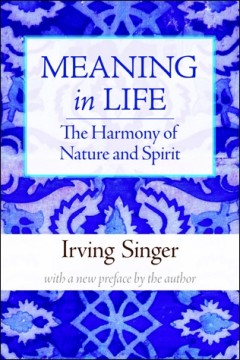
Meaning in Life: The harmony of nature and spirit
An acclaimed philosopher suggests that the art of living well employs the same principles as those that exist in all artistic creativity.This final book in Irving Singer's Meaning in Life trilogy studies the interaction between nature and the values that define human spirituality. It examines the ways in which we overcome the suffering in life by resolving our sense of being divided between the…
- Edition
- -
- ISBN/ISSN
- 9780262259200
- Collation
- 1 online resource (xix, 222 pages).
- Series Title
- -
- Call Number
- -

Against nature
A pithy work of philosophical anthropology that explores why humans find moral orders in natural orders. Why have human beings, in many different cultures and epochs, looked to nature as a source of norms for human behavior From ancient India and ancient Greece, medieval France and Enlightenment America, up to the latest controversies over gay marriage and cloning, natural orders have been enli…
- Edition
- -
- ISBN/ISSN
- 9780262353809
- Collation
- 1 online resource (96 pages) :illustrations.
- Series Title
- -
- Call Number
- -
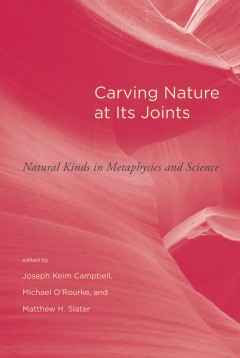
Carving Nature at Its Joints: Natural Kinds in Metaphysics and Science
"A Bradford book.""Contemporary discussions of the success of science often invoke an ancient metaphor from Plato's Phaedrus: successful theories should 'carve nature at its joints.' But is nature really 'jointed'? Are there natural kinds of things around which our theories cut? The essays in this volume offer reflections by a distinguished group of philosophers on a series of intertwined issue…
- Edition
- -
- ISBN/ISSN
- 9780262298780
- Collation
- 1 online resource (viii, 355 pages).
- Series Title
- -
- Call Number
- -
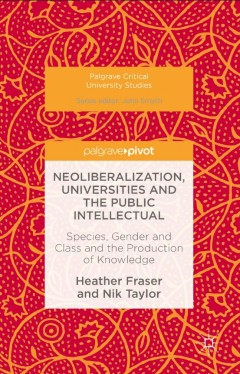
Neoliberalization, Universities and the Public Intellectual
This book employs an an intersectional feminist approach to highlight how research and teaching agendas are being skewed by commercialized, corporatized and commodified values and assumptions implicit in the neoliberalization of the academy. The authors combine 50 years of academic experience and focus on species, gender and class as they document the hazardous consequences of seeing people as …
- Edition
- 1
- ISBN/ISSN
- 978-1-137-57908-9
- Collation
- XIII, 142
- Series Title
- Palgrave Critical University Studies
- Call Number
- -
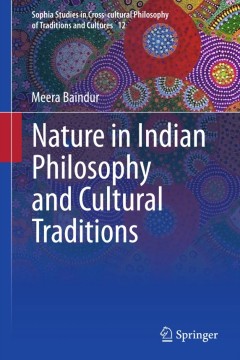
Nature in Indian Philosophy and Cultural Traditions
Working within a framework of environmental philosophy and environmental ethics, this book describes and postulates alternative understandings of nature in Indian traditions of thought, particularly philosophy. The interest in alternative conceptualizations of nature has gained significance after many thinkers pointed out that attitudes to the environment are determined to a large extent by our…
- Edition
- 1
- ISBN/ISSN
- 978-81-322-2999-5
- Collation
- XV, 219
- Series Title
- Sophia Studies in Cross-cultural Philosophy of Traditions and Cultures
- Call Number
- -
 Computer Science, Information & General Works
Computer Science, Information & General Works  Philosophy & Psychology
Philosophy & Psychology  Religion
Religion  Social Sciences
Social Sciences  Language
Language  Pure Science
Pure Science  Applied Sciences
Applied Sciences  Art & Recreation
Art & Recreation  Literature
Literature  History & Geography
History & Geography